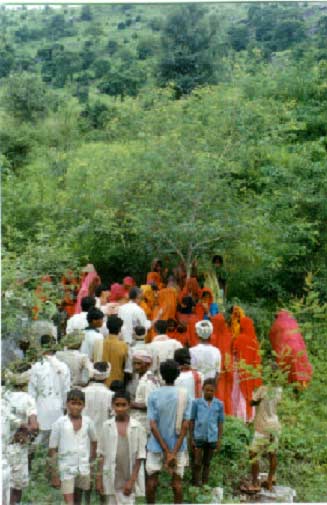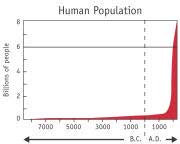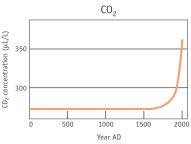Multi-Stakeholder Training Programme on Climate Change
Multi-Stakeholder Training Programme on Climate Change Mitigation through Participatory Carbon Management in Multifunctional ForestsA Training Series (June 2002-December 2002)
|
 |
 |
 |
|
 |
Introduction
Fossil fuel burning and deforestation have emerged as principal anthropogenic source of rising levels of CO2 in the atmosphere and the consequential global warming. Variability in temperature, precipitation, snow cover, sea-level and extreme weather events provide collateral evidence of global climate change. This training program will draw from the recent advances on causes and consequences of global climate change and its impact on nature and society to prepare the training module and impart a series of training on Climate Change Mitigation through Participatory Carbon Management in Multifunctional Forests. Impact of climate change on ecology, economy and society-the three pillars of sustainability-is increasing. Emission reduction, although most useful, is also politically sensitive for economic reasons. Proposals of the geoengineering for iron fertilization of oceans or manipulation of solar flux using stratospheric scatters are yet not feasible for scientific and environmental reasons. Forests as carbon sinks, therefore, are required to play multifunctional role that include, but are not limited to, biodiversity conservation and maintenance of ecosystem functions; yield of goods and services to the society; enhancing the carbon storage in trees, woody vegetation and soils; and providing social and economic well-being of people. This training programme will specifically explore strategies in that direction and provide options for management of multifunctional forests over landscape continuum, employing tools of conservation biology and restoration ecology, as a vital option for climate change mitigation in future.
Rational for the Training Programme
Thus, there are six fundamental reasons for the module development and training series:
1. While enough knowledge has been generated on the science of climate change and its relationship with forests, stakeholders have limited experience on how to manage multifunctional forests that simultaneously address biodiversity conservation and maintenance of ecosystem functions, yield of goods and services to the society, enhancing the carbon storage in trees, woody vegetation and soils, and providing social and economic well-being to the people. Providing a coherent basket of climate change mitigation options on
multifunctional forests would, therefore, contribute to the objectives of the Kyoto Protocol as well as other UN conventions having a bearing on the sustainability of the planet. Synergies among Convention on Biological Diversity, Desertification Convention, World
Heritage Convention, UN Forum on Forests, and the United Nations Framework Convention on Climate Change need to be explored and understood simultaneously.
2. Science of climate change is less well known beyond the confines of the scientific community who by themselves lack power to implement their recommendations. This is particularly true for the third world masses. The training series is a step in that direction to reach to the people who matter most. An informed society alone can make the difference.
3. People who are aware of the reasons of climate change are more likely to act responsibly and support policies to mitigate climate change. Therefore, training and awareness programs are needed in India, where only one-third of the respondents in a sample of more than one thousand educated people could perceive a correct concept of biodiversity, acid rain, desertification, and threats posed by the loss of biodiversity. The training programme will also provide opportunity to participants to understand the role of local knowledge and institutions in sustainable management of tropical forests.
4. Despite enormously growing literature on climate change, there is a distinct lack of training material specifically targeted to multistakeholders on sustainable management of multifunctional tropical forests and agroforests as carbon sinks.
5. The exotic species have often dominated in restoration efforts throughout the tropics; they are now, therefore, primary candidates in carbon sequestration projects. Although there is an important role for plantations, exotics should not be the only option in tropical afforestation and reforestation projects. Nonetheless, in the absence of alternative species, planting designs, and strategies, exotic species and monoculture planting may likely become the norm in tropical regions for carbon sequestration. In order to present the knowledge to practitioners we need a well-designed programme to make practitioners aware on the multifunctional role that indigenous species and forests play.
6. A practitioner-oriented training program and training material that combines the principles of conservation biology, restoration ecology and community participation is most desirable, but currently unavailable. This training series shall act as training of trainers who will in turn either support practice on the ground or provide training to frontline managers they interact with routinely.
Objectives and Course Description
Three main objectives of this course are to develop course material for the multistakehoder training programme on Climate Change Mitigation through Participatory Carbon Management in Multifunctional Forests; and to develop an understanding of the causes, consequences, and the mitigation options within the framework of sustainability science for tropical forests among the participants, and to equip them with the skills of participatory designing and field application of climate change mitigation through conservation, restoration and management of multifunctional forests.
Participants will be various stakeholders including foresters, civil society, teachers, researchers, students and others either working or intending to work for climate change mitigation, sustainability science, forest restoration, and natural resource management in south Asia. Preference will be given to those who are engaged in exploring and implementing the sustainability science and human dimensions of global change on the ground. Representation of both genders shall be encouraged. Organizations nominating more than one candidate must nominate women as well.
Course contents and essential reading
- Science of the Climate Change
- Causes and consequences of global climate change
- Ecological responses of climate change
- Sustainability science for tropical forests
- Multifuntionality of tropical forests
- Options for climate change mitigation through multifunctional forest management
- Principles and practices of conservation biology that contribute to carbon management in tropical forests
- Principles and practices of restoration ecology that contribute to carbon management in tropical forests
Basic Reading Material
Participants Kit: Participants shall be provided the basic reading material that they carry with them for future use in the field. A rich collection of state-of-art papers on global climate change mitigation options and various components of the module shall be prepared for distribution. Specific research and policy articles that address the management of multifunctional tropical forests shall also be procured for inclusion in the kit. In order to keep participants informed over the course of follow-up, they shall be given subscription to the best research journal in India. Based on the past record of research publications on climate change in India, we have identified the journal Current Science, published by the Indian Academy of Sciences, Bangalore, as this is the most cited (journal with highest Science Citation Index in India) and most relevant and authentic source for the knowledge on climate change in India.
Electronic Presentation Kit: The presentation kit shall be designed for the training program. This will incorporate the course contents listed earlier.
Innovative use of Online Digital Library During the Training: The training program will use the UNFCCC and IPCC digital collection of information, UNEP-GRIDA-ARENDAL, and Conservation Ecology. We are thankful for the permissions.
Training Schedule and Methods
The training duration shall be 5 days (Monday through Friday) for the each of the two training programs. Training method shall be the participatory pooling of current knowledge, identification of gaps and providing relevant knowledge. All participants will become familiar with theoretical aspects of global climate change as well as practical application for participatory carbon management in multifunctional forests. Participants shall:
1. Read current literature about the climate change provided to them.
2. Discuss and debate the course contents as listed above in the classroom.
3. The design of the course will provide opportunities for discussion, presentations and synthesis by participants.
We hope that after completion of the training participants shall be able to follow-up and be able to apply knowledge in the field where they are working.
An innovation in training method will include use of peer-reviewed research available in research journals online with the permission the journals and organizations.
IIFM computer centre, with excellent facilities including e-mailing system, intranet and internet, remains open round the clock.
Expectations from the Faculty
During the entire course period faculty will meet every day in a pre-dinner session to review the progress, decide the future course of action, modify the methodology for imparting the training and resolve other issues related to training. This will help to keep the training focused and meaningful.
Expectations from the Participants
Willing Participation
Participate in fieldwork, field note writing, class discussions and exercise. Participants will have to complete the assignments given in class by the faculty. We can learn only if we try.
Presentations:
Apart from the class discussions participants will make several presentations based on the exercises. They will also be required to form groups several times for accomplishing the learning tasks assigned to them.
Registration and Process of Selection
Nominations supported by a desire of the organisation in which the candidate is working to use the services of the trained persons for the cause of management of multifunctional forests and agroforests in India shall be preferred. We will also welcome the contribution of the organization sponsoring the candidate in various ways including the time of the candidate, travel costs etc that organisation may like to contribute. Participants can register by sending e-mail to Course Coordinator giving complete personal and institutional address, phone, fax, e-mail, Curriculum Vitae and other details. The candidates should also enclose the letter endorsing their candidature by the organization. We will examine the application and inform appropriately.
Course Fee: Rs. 8000/- for Indian nationals, Rs. 12,000 for participants from other South Asian countries, and US$ 500 for foreign nationals. The fee does not include travel. Limited number of fellowships for deserving candidates are available through Winrock-Ford Small grant to facilitate participation. Should you wish to apply for the fellowship please send the detailed CV. If awarded, the fellowship will cover course fee and travel.
Indian Institute of Forest Management, Bhopal, India (http://www.iifm.org)
Indian Institute of Forest management (IIFM), Bhopal, with excellent teaching, training, education and consulting facilities, is situated in the heartland of India. It is a unique national institution of international repute. IIFM was established in 1982 as an autonomous Institute under the Ministry of Environment and Forests, Government of India with an objective of providing leadership in the field of forest management by developing professional excellence through research, education, training, extension and advisory activities. IIFM has gained significant experience working with policy makers and international donor agencies on one hand, and a wide range of professionals like foresters, development workers, academicians, NGOs, and local people on the other. In this process, it has contributed to the conceptual shift in the field of forest management, towards the community participation in the management of forests.
IIFM has taken the lead in the field of C & I for sustainable forest management in India. The Bhopal-India Process of identification and implementation of Criteria & Indicators for sustainable forest management is known and recognized world-wide. The first, and so far the only one of its kind in the South Asian Region, IIFM is all set to provide the leadership in the field of Sustainable Forest management (SFM). Realizing the global importance of the subject, IIFM has already initiated the Bhopal-India Process to evolve a set of ‘Criteria and indicators’ for SFM in India and look forward to extend the same, with appropriate modifications to other countries in the region. In this process, the multi-disciplinary faculty team of IIFM – a unique combination of technical forestry, management, social and behavioral sciences – adds strength through its educational, training, research and consulting activities.
IIFM is recognized as a very reputed training center in the field of forestry. The issues and projects addressed include World Bank -WWF sponsored Measures of Success for sustainable Forest Management, FAO LFCC, ITTO SFM project, Participatory Forest Management, Ethnoforestry and Indigenous Knowledge on Forest Management, Joint Forest Management, and Community Forestry. Forest managers, community forestry professionals, grassroots functionaries, researchers and trainers attend training courses from government and non-government organizations across the region.
IIFM offers three educational programs viz. PG Diploma in Forest Management (PGDFM) for fresh graduates of different streams and M.Phil course on Resource Management (MRM) for serving professionals, and the PhD programme. Our students come from SAARC countries as well and they are encouraged to carry out studies in their respective country situations. IIFM, thus, stands benefited of accumulated research experience across countries in the subcontinent.
Our collaborative programmes with national and international bodies include FAO, the World Bank, WWF, RECOFTC, CIFOR, FAO, IUFRO, ITTO, NIES (Japan), Ford foundation, Asia Forest Network, SIDA, IDRC, TERI, ADB etc.
Programme Directors
Deep Narayan Pandey, Indian Forest Service (1988: Rajasthan). Currently on deputation to Indian Institute of Forest Management, Bhopal as Associate Professor. Coordinated and conducted the World Bank sponsored training series (1999-2002) on Measures of Success for Sustainable Forest Management. Received national honor in forestry in India, Indira Priyadarshini Vrikshamitra Award, given by the Government of India for the year 1994 for outstanding field work in forestry. Won the Hewetson Gold Medal for the Best Forester in 1984, Government Silver Medal for Forest Management in 1987, and Environment award in 1995, given by a leading Indian NGO. Wrote 8 books, with 27,000 copies sold (1991-2002), published 167 papers in peer-reviewed journals, chapters in peer-reviewed books, and popular science and policy magazines. Member of the American Association for the Advancement of Science, Society for Conservation Biology, IUCN Commission on Ecosystem Management, International Eco-Ethics Union, Fellow of the Society of Ethnobotanists, Coordinator IUFRO Research Group 6.19.00 Ethnoforestry, among others.
Address: Indian Institute of Forest Management, Post Box No 375, Nehru Nagar, Bhopal-462
003, Telephone 91 755 775716, 773799, 765125, Fax: 772878. E-mail: deep@iifm.org
Dr. Niraj Kumar, faculty at IIFM, has written extensively on community forestry, joint forest management, and management of commons. Published several papers in peer-reviewed journals and popular magazines. Currently involved in exploring the links between climate change mitigation and community forestry.
Address: Indian Institute of Forest Management, Post Box No 375, Nehru Nagar, Bhopal-462
003, Telephone 91 755 775716, 773799, 765125, Fax: 772878. E-mail: nkumar@iifm.org
Course Panel
Shri N.K. Joshi, Director, IIFM, Bhopal, and the Additional Director General of Forests, Government of India
Prof. Deep N. Pandey, Faculty of Ecosystem Management and Forestry, IIFM, Bhopal
Dr. Niraj Kumar, Faculty of Communications and extension, IIFM, Bhopal
Dr. C. S. Rathore, Faculty of Computer Science, IIFM, Bhopal
Dr. P.C. Kotwal, Faculty of Ecosystem Management and Forestry, IIFM, Bhopal
Dr. V.L.V. Kameswari, Faculty of Communications and extension, IIFM, Bhopal
Dr. A. Bhattacharya, Faculty of Ecosystem Management and Forestry, IIFM, Bhopal
Dr. R. K. Singh, Faculty of Ecosystem Management and Forestry, IIFM, Bhopal
Dr. V.K. Sinha, Faculty of Ecosystem Management and Forestry, IIFM, Bhopal
Prof. P. K. Biswas, Faculty of Sociology, IIFM, Bhopal
Dr. Dharmendra Dugaya
Resource Persons from the Winrock International, India
Dr. Kinsuk Mitra, Deputy Country Chief, Winrock International India
Bibliography
Agoramoorthy, G., and K.J. Hsu. 2002. The threat of human-induced climate change cannot be ignored. Current Science 82: 904-905.
Arthur, R. 2000. Coral bleaching and mortality in three Indian reef regions during an El Niño southern oscillation event. Current Science 79: 1723-1729.
Bawa, K. S., Seidler, R. 1998. Natural forest management and conservation of biodiversity in tropical forests. Conservation Biology 12, 46-55.
Beier, Paul & Noss, Reed F. 1998. Do habitat corridors provide connectivity? Conservation Biology 12 (6), 1241-1252.
Berkes, F. and D. Jolly. 2001. Adapting to climate change: social-ecological resilience in a Canadian western Arctic community. Conservation Ecology 5(2): 18. [online] URL: http://www.consecol.org/vol5/iss2/art18
Borden, J. H.;, Marland, G., Schlamadinger, B., Matthews, R. 2000. “Kyoto forests” and a broader perspective on management. Science 290, 1895-1986.
Chhabra, A., Palria, S., Dadhwal, V.K. 2002. Growing stock-based forest biomass estimate for India. Biomass and Bioenergy 22, 187-194.
Davis-Case, D. A. 2001. The reflective practitioner: learning and teaching in community-based forest management. Conservation Ecology 5(2): 15. [online] URL: http://www.consecol.org/vol5/iss2/art15
FAO., State of the World’s Forests 2001, Food and Agriculture Organization of the United Nations, Rome, Italy, 2001, pp. 181.
Gadgil, S., 1995. Climate change and agriculture – an Indian perspective. Current Science 69, 649-659.
Garg, V. K. 1999. Leguminous trees for the rehabilitation of sodic wasteland in northern India. Restoration Ecology 7 (3), 281-287.
Gatto, M., A. Caizzi, L. Rizzi, and G. A. De Leo. 2002. The Kyoto Protocol is cost-effective. Conservation Ecology 6(1): r11. [online] URL: http://www.consecol.org/vol6/iss1/resp11
Greenstone, M.H. 2002. Greenhouse gas mitigation: The biology of carbon sequestration. BioScience 52, 323-323.
Hannam K. 2000. Utilitarianism and the Identity of the Indian Forest Service. Environment and History 6, 205-228.
Houghton, J. T. et al. (eds) Climate Change 2001: The Scientific Basis. Cambridge Univ. Press, 2001.
Hughes, L. 2000. Biological consequences of global warming: is the signal already apparent? Trends in Ecology & Evolution 15: 56-61.
Kadekodi, G.K., Ravindranath, N.H. 1997. Macro-economic analysis of forestry options on carbon sequestration in India. Ecological Economics 23, 201-223.
Kates, R. W., W.C. Clark, R. Corell, J. M. Hall, C.C. Jaeger, I. Lowe, J.J. McCarthy, H.J. Schellnhuber, B. Bolin, N.M. Dickson, S. Faucheux, G. C. Gallopin, A. Grubler, B. Huntley, J. Jager, N.S. Jodha , R. E. Kasperson, A. Mabogunje, P. Matson, H. Mooney, B. Moore III, T. O’Riordan, and U. Svedlin. 2001. Sustainability science. Science 292: 641-642.
May, R. M. 2002. The future of biological diversity in a crowded world. Current Science 82: 1325-1331.
McCarthy, J. J., Canziani, O. F., Leary, N. A., Dokken, D. J. and White, K. S. (eds.) Climate change 2001: Impacts,Adaptation, and Vulnerability – Contribution of Working Group II to the Third Assessment Report of the Intergovernmental Panel on Climate Change. Cambridge Univ. Press, Cambridge, 2001.
Meher-Homji, V.M. 2000. Climate changes: projections and prospects. Current Science 78, 1-2.
Munasinghe, M. 2001. Exploring the linkages between climate change and sustainable development: A challenge for transdisciplinary research. Conservation Ecology 5(1): 14. [online] URL: http://www.consecol.org/vol5/iss1/art14
Noble, I.R., Dirzo, R. 1997. Forests as human-dominated ecosystems. Science 277, 522-525.
Noss, R. F. 2001. Beyond Kyoto: Forest management in a time of rapid climate change. Conservation Biology 15, 578-590.
Pachauri, R. K. and A. Behl (eds). 1991. Global Warming: Mitigation Strategies and Perspectives from Asia and Brazil. New Delhi: Asian Energy Institute. 205 pp.
Pandey, D. N. 1993. Wildlife, national parks and people. Indian Forester 119: 521-529.
Pandey, D. N. 1998. Ethnoforestry: Local Knowledge for Sustainable Forestry and Livelihood Security. Himanshu, New Delhi.
Pandey, D. N. 2001. A bountiful harvest of rainwater. Science 293: 1763-1763.
Pandey, D. N. 2002. Carbon sequestration in agroforestry systems. Climate Policy PII: S1469-3062(02)00025-6 (article in press), available at http://www.elsevier.com/inca/publications/store/6/2/1/2/6/7/
Pandey, D. N. 2002. Cultural resources for conservation science (in press).
Pandey, D. N. 2002. Global climate change and carbon management in multifunctional forests. Current Science (in press).
Pandey, D. N. 2002. Indigenous sustainability science. Human Ecology (submitted; under review).
Pandey, D. N. 2002. Sustainability science for tropical forests. Conservation Ecology 6(1): r13. [online] URL: http://www.consecol.org/vol6/iss1/resp13
Pandey, D. N., Measures of Success for Sustainable Forestry, World Bank – WWF Global Alliance for Forest Conservation and Sustainable Use; IIFM, Bhopal, 2001, pp.125
Pandey, N. 2002. Gender economics of the Kyoto Protocol. Conservation Ecology 6(1): r14. [online] URL: http://www.consecol.org/vol6/iss1/resp14.
Peterson, G., G.A. De Leo, J.J. Hellmann, M.A. Janssen, A. Kinzig, J.R. Malcolm, K.L. O’Brien, S.E. Pope, D.S. Rothman, E. Shevliakova, and R.R.T. Tinch. 1997. Uncertainty, Climate Change, and Adaptive Management. Conservation Ecology [online] 1(2): 4. URL: http://www.consecol.org/vol1/iss2/art4
Phillips, O. L., Y. Malhi, N. Higuchi, W.F. Laurance, P.V. Núñez, R.M. Vásquez, S.G. Laurance, L.V. Ferreira, M. Stern, S. Brown, and J. Grace. 1998. Changes in the carbon balance of tropical forests: evidence from long-term plots. Science 282: 439-442.
Prentice, I. C. et al., IPCC Third Assessment Report 2001, Cambridge Univ. Press, 2001, vol. 1, pp 183-237.
Pruthi, S., S. Khan, and M.A. Qureshi. 1999. Human dimensions of climate change: Results of a survey of scientists and engineers. Current Science 77: 1589-1597.
Rajvanshi, A. K., Talukas can provide critical mass for India’s sustainable development. Current Science, 2002, 82, 632-637.
Ramakrishnan, P.S., 1998. Sustainable development, climate change and tropical rain forest landscape. Climatic Change 39: 583-600.
Rao, U.R., and S. C. Chakravarty. 1992. An evaluation of global warming and its impact. Current Science 62: 469-478.
Rastogi, M., S. Singh, and H. Pathak. 2002. Emission of carbon dioxide from soil. Current Science 82: 510-517.
Ravindranath, N. H., Pandey, D. N., Murthy, I., Bist, R., Jain, D. 2001. The clean development mechanism and village-based restoration in central India. In, Poffenberger, M. (ed.) Communities & Climate Change. CFI, Santa Barbara, USA pp.1-73.
Ravindranath, N.H., Sukumar, R. 1998. Climate change and tropical forests in India. Climatic Change 39, 563-581.
Resh, S.C., Binkley, D., Parrotta, J.A. 2002. Greater soil carbon sequestration under nitrogen-fixing trees compared with Eucalyptus Species. Ecosystems 5, 217-231.
Riitters, K., J. Wickham, R. O’Neill, B. Jones, and E. Smith. 2000. Global-scale patterns of forest fragmentation. Conservation Ecology 4(2): 3. [online] URL: http://www.consecol.org/vol4/iss2/art3
Saha, S. 2002. Anthropogenic fire regime in a deciduous forest of central India. Current Science 82, 1144-1147.
Schimel, D. S., J.I. House, K.A. Hibbard, P. Bousquet, P. Ciais, P. Peylin, B.H. Braswell, M.J. Apps, D. Baker, A. Bondeau, J. Canadell, G. Churkina, W. Cramer, A.S. Denning, C.B. Field, P. Friedlingstein, C. Goodale, M. Heimann, R.A. Houghton, J.M. Melillo, B. Moore III, D. Murdiyarso, I. Noble, S.W. Pacala, I.C. Prentice, M.R. Raupach, P.J. Rayner, R.J. Scholes, W.L. Steffen, and C. Wirth. 2001. Recent patterns and mechanisms of carbon exchange by terrestrial ecosystems. Nature 414: 169-172.
Schulze, E.-D., Wirth, C., Heimann, M. 2000. Managing forests after Kyoto. Science 289, 2058-2059.
Shastri, C. M., Bhat, D. M., Nagaraja, B. C., Murali, K. S., Ravindranath, N. H. 2002. Tree species diversity in a village ecosystem in Uttara Kannada district in Western Ghats, Karnataka. Current Science 82, 1080-1084.
Singh, J.S. 2002. The biodiversity crisis: a multifaceted review. Current Science 82: 638-647.
Singh, R and Lal, M. 2000. Sustainable forestry in India for carbon mitigation. Current Science 78(5): 563-567
Singh, T. P., Varalakshmi, V., Ahluwalia, S. K., 2000. Carbon sequestration through farm forestry: case from India. Indian Forester 126: 1257-1264.
Stier, Sam C. & Siebert, Stephen F. 2002. The Kyoto Protocol: an opportunity for biodiversity restoration forestry. Conservation Biology 16 (3), 575-576.
Walker, B., and W. Steffen. 1997. An overview of the implications of global change for natural and managed terrestrial ecosystems. Conservation Ecology [online]1(2): 2. Available from the Internet. URL: http://www.consecol.org/vol1/iss2/art2
Walther, G.-R., Post, E., Convey, P., Menzel, A., Parmesan, C., Beebee, T.J.C., Fromentin, J.-M., Hoegh-Guldberg, O., Bairlein, F., 2002. Ecological responses to recent climate change. Nature 416: 389-395.
Watson, R. T. et al. 2000. Land Use, Land-Use Change and Forestry. IPCC Special Report. Cambridge University Press, Cambridge.
Wesemael, Bas van, Lambin, Eric F. 2001. Carbon sinks and conserving biodiversity. Science 294: 2094-2095.
Whiteman, G. 1999. Sustainability for the planet: a marketing perspective. Conservation Ecology 3(1): 13. [online] URL: http://www.consecol.org/vol3/iss1/art13
